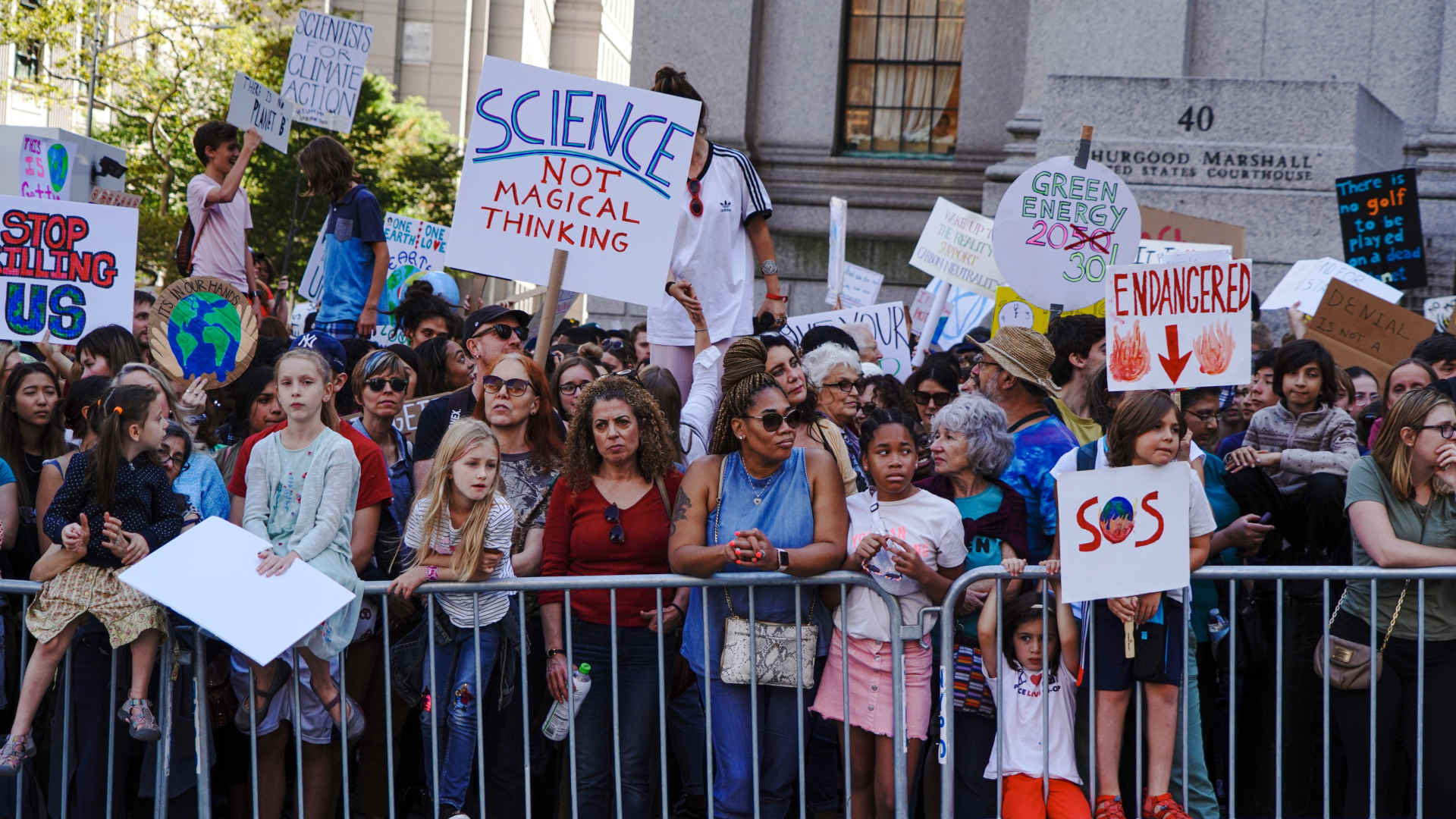Past International Climate Talks Have Proved Ineffective. Why?
It’s been more than 30 years since the Intergovernmental Panel on Climate Change first warned the world that greenhouse gases were dangerously warming the global climate. Decades of United Nations climate negotiations followed, culminating in the 2015 Paris agreement. Yet, in that time, humans have pumped more carbon dioxide into the air than in the preceding 240 years.
Since that first IPCC report in 1990, emissions have increased 60 percent and the average global temperature has climbed about 0.75 degrees Celsius, contributing to rapid increases in deadly heat waves, tropical storms, droughts, and sea level rise on every continent. According to the United Nations Emissions Gap report released Oct. 27, the most recently updated climate pledges shave about 7.5 percent off 2030 emissions, while a reduction of 55 percent is needed to meet the target of the Paris agreement. That puts Earth on track to heat 2.7 degrees Celsius by 2100, a dangerous amount of warming well beyond the Paris agreement target of 1.5 degrees Celsius.
The reasons emissions and temperatures have continued to increase, even as their impacts and global efforts to rein them in have grown, are complex, and the answers depend on whom you ask. But some recent climate studies suggest a common thread in the hows and whys: the continued failure to put environmental justice at the center of climate negotiations.
Progress at the COP26 climate talks in Glasgow could hinge on whether negotiators talk seriously about the inequality of emissions and climate impacts, said Isak Stoddard, an Uppsala University climate researcher and the lead author of a new study that asks why world governments haven’t managed to bend the emissions curve downward, and what they could do differently.
“The wealthiest 1 percent of the world’s population emits twice as much as half the human population, and the top 10 percent more than half of all global emissions, which is so wrong in so many ways,” he said.
High emitters have the most power in global climate talks and, at the same time, often feel less vulnerable to climate impacts, which weakens their incentives to cut emissions. Those least responsible for the pollution warming the climate often suffer the worst impacts, yet have little leverage at climate talks, Stoddard and the international team of researchers wrote in the paper, published in the Annual Review of Environment and Resources.
Advancing climate policy requires more than just focusing on emissions reductions, Stoddard said. Climate change is a “symptom of a much broader ecological and social crisis — an unjust and unsustainable political and economic system,” he said.
“What sort of societies, what sort of mentalities and world views of human beings, of women, or of nature have brought about the extraction of fossil fuels and the transformation of lands and oceans we’ve seen over the past hundreds of years?” he asked.
The human behaviors and societal patterns that have driven economic development for two centuries have also created deep economic, social, cultural, and psychological dependencies on fossil fuels. Dominant economic and political interests have fought hard against meaningful change to societal structures that grew out of colonialism, imperialism, and other systemic injustices, the researchers wrote.
“Top-down power is one of the things that hinder us from actually transforming our societies in ways that would rapidly bring down emissions,” Stoddard said. A building wave of grassroots social movements may end up being the main agent of change, he added.
The top-down power structure and its failure to address climate justice have been obvious since the early days of U.N. climate negotiations, said Anju Sharma, who first represented India at the 1997 COP3 climate talks in Kyoto, Japan and who has attended most of the annual global climate summits since then.
Developing countries wanted to address equity issues from the start, and there were serious proposals, but “for days, the U.S. said, ‘No, we’re not playing ball,’” Sharma said. “We were told if we start talking about equity they, the developed countries, will walk out all together.”
On the ninth day, the U.S. relented. “Al Gore held a press conference and said ‘I’m going to ask my team to show increased flexibility,’” she recalled, citing that as an example of how key global climate decisions have mainly been shaped by the world’s superpowers.
In climate talks, inequality isn’t only apparent in the huge disparities in wealth and vulnerability to climate impacts between different nations, but also in their varying capacities to participate in negotiations, she added.
At Kyoto, the United States had dozens of climate negotiators and even more specialized support staff like lawyers and economists, while India had three people and some African countries had only one involved in “extremely technical negotiations,” she said. “It’s negotiation by exhaustion.”
That’s what derailed proposals for an equitable development mechanism that could have addressed some of pressing global climate justice issues early in the process. Sharma said she and the other Indian negotiators convinced their government to resist the demands of wealthier, more powerful nations for a while, stepping into the role of leading the developing countries bloc. But the rich, developed countries got their way in the end, she said, after “Bill Clinton called the environment minister and the prime minister and told them to back off.”
While it’s impossible to know what might have been, climate experts like Stoddard and Sharma are convinced that earlier progress on climate justice would have helped propel the process more quickly toward meaningful global climate action.
The Kyoto examples reinforce the argument in the study by Stoddard’s team that top-down power structures are hindering climate action. More democratization of societies is “absolutely necessary” to break down those obstacles, Stoddard said.
“What’s the point if we don’t have lives where we have the feeling of agency, and feelings of living lives that are meaningful?” he said. “The human spirit is on the line.”
During times of crisis there is a need for more, not less, democracy, even amidst increasing calls for authoritarianism, he said. There are “many forms of democracy that have not been tried yet,” he said.
Emerging tools for a democratization of climate policy include the citizen’s assemblies and councils that have been tried in several countries, such as France, after a series of protests partially sparked by climate policy, and Germany, just ahead of a recent election seen as critical for European climate policy.
“We’re living in a time of a weakened democracy and it’s being attacked,” said Marie-Luise Beck, who helped organize the German citizens’ climate council. “Science is also under attack, but this form of engagement — touchable democracy in the form of mini-parliaments — can strengthen democracy,” she said.
“A lot of researchers say we have to find new approaches,” she continued. “It’s not enough to say we’ll take the instruments and rules of the 20th century to solidify democracy in the 21st century. It’s probably not going to work. Or we can just say, ‘OK, a dictatorship is cooler.’”
In Germany, 160 citizens were chosen in a weighted lottery to accurately represent the demographics of the nation. They met 12 times with professional facilitators who helped them draw up a list of 84 detailed climate policy recommendations, including drastically reducing meat and dairy consumption, eliminating coal use faster than currently planned and requiring communities to complete climate protection plans by 2023.
The recommendations are non-binding, but reinforce a clear message that’s emerging in many countries — citizens want more and faster climate action than currently planned by most governments, as shown by polling in many countries as well as increasing climate activism.
“The climate council in Germany was a real grassroots effort showing that people want to take control of their collective climate destiny,” Beck said. “The value is believability. It’s citizens, not lobbyists speaking. Citizens are more inventive and more serious than we give them credit for.”
She said she is somewhat surprised that similar councils haven’t emerged in the U.S., a country with “a reputation for citizens taking their fate into their own hands, while Europeans are often characterized as being more willing to listen to authority.”
But American grassroots climate policy has manifested in other ways, including lobbying groups like the Citizens’ Climate Lobby and direct political activity by the Sunrise Movement that helped candidates favoring climate action win political races, setting the stage for the current congressional debates about climate policy.
Other climate policy controls outside of the governance of the U.N. include environmental litigation, pressure on economic markets, institutional divestment from companies that contribute to global warming, and social activism, such as protests. Together, those factors could affect greenhouse gas emissions as much as any new agreements reached within the U.N. framework, Beck said.
The deliberations also showed that, while many people have a passing awareness of climate change, there is room for deepened awareness of “how serious the climate crisis is, and how many solutions there already are,” she said. At least for the council members, it became clear that “we’re already living in a different climate than at any other time in our civilizational history,” with dangerous, intensifying climate extremes.
Grassroots civic activism, including climate councils, is one of the forms of power that Stoddard’s team explored in their paper as they tried to describe ways to break the climate policy gridlock by shifting the framing. The current structure of climate negotiations doesn’t allow any space for showing how things could be different, he said. Right now, the system actively marginalizes different visions of what human societies are and could be, he added.
The strength of diverse, local, grassroots social movements works together with the power of new ideas and the ability to set examples for doing things a different way, he said. “For example, if we start addressing inequality first, what happens then with how we define climate mitigation?” he added. “What are ways to think outside the fossil fuel paradigm?”
Bob Berwyn an Austrian-based freelance reporter who has covered climate science and international climate policy for more than a decade.
This story was originally published by Inside Climate News.











